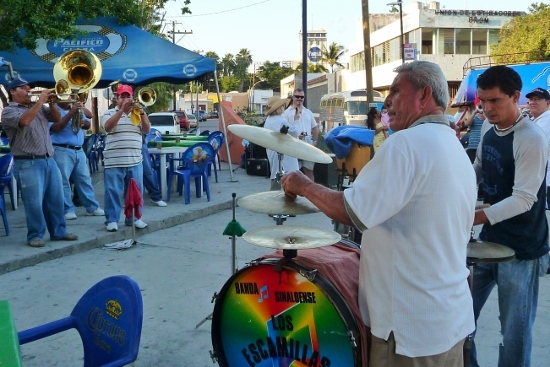From the Sierra Morena,
Pretty darling, they come down
a pair of black eyes
Pretty little heaven, which are contraband
One of many translations of the Mexican song, "Cielito Lindo."
Chances are you've belted out your share of "Ay, ay, ay, ay" choruses in that timeless Mexican song about a lovely lady with dark eyes. Everyone knows "Cielito Lindo," right? Even if you've never been to Mexico. Even if you have no idea what "Sierra Morena" means. Or why the lady's eyes are called "contraband." Or what a mole has to do with the song.

'Cielito Lindo' might have looked like this little Mexican girl. Photo by Bob Schulman.
Like most Latin golden oldies, "Cielito Lindo" (written in 1882) has several versions and lots of meanings. A popular story has it the song was inspired by 17th century legends about a bandit-infested mountain range in southern Spain called the Sierra Morena. Quirino Mendoza y Cortes, the Mexican composer, is believed to have heard yarns about a "cielito lindo" (roughly meaning a "lovely sweet one") who was rescued from the outlaws and smuggled out of the hills. Hence the word, "contraband."
Besides dark, flashing eyes, the lady was said to have a "lunar" (a mole) near her mouth. The blemish got into the song this way: "Ese lunar que tienes" ("That mole you have"). The composer (apparently a mole man) goes on to say. "Don't give it to anyone... it belongs to me."
I Am a Captain, Not a Sailor
Like your "ay ays" in "Cielito Lindo," you've likely sung lots of "bam, bam, bambas" between verses of another Mexican oldie called "La Bamba." And you've probably heard that the ballad, popularized by Ritchie Valens in his 1958 chart-topper and again in the 1987 movie about Valens, is a happy Mexican wedding dance.
But one version of the lyrics tells the story of a guy who loved and lost, and who turned up being anything but happy at his ex-girlfriend's wedding. The song ends this way: "Oh I ask you out of compassion, that "La Bamba" end and another song start."

Mexican street band bats out 'La Bamba' in Mazatlan. Photo by Bob Schulman.
No one knows when the song was written, or even who wrote it. What's known for sure is that it's a classic Veracruz "son jarocho" tune, typically plucked out on a gut-string harp backed by three or so guitars. (People down in Veracruz have been known to cringe when they hear Ritchie's rock version.)
What's the meaning of "La Bamba's" iconic words, "I am not a sailor, I am a captain?" Ask that question in Veracruz, and the answer you most often get is, "quien sabe" (who knows).
Support HuffPost
Our 2024 Coverage Needs You
Your Loyalty Means The World To Us
At HuffPost, we believe that everyone needs high-quality journalism, but we understand that not everyone can afford to pay for expensive news subscriptions. That is why we are committed to providing deeply reported, carefully fact-checked news that is freely accessible to everyone.
Whether you come to HuffPost for updates on the 2024 presidential race, hard-hitting investigations into critical issues facing our country today, or trending stories that make you laugh, we appreciate you. The truth is, news costs money to produce, and we are proud that we have never put our stories behind an expensive paywall.
Would you join us to help keep our stories free for all? Your contribution of as little as $2 will go a long way.
Can't afford to donate? Support HuffPost by creating a free account and log in while you read.
As Americans head to the polls in 2024, the very future of our country is at stake. At HuffPost, we believe that a free press is critical to creating well-informed voters. That's why our journalism is free for everyone, even though other newsrooms retreat behind expensive paywalls.
Our journalists will continue to cover the twists and turns during this historic presidential election. With your help, we'll bring you hard-hitting investigations, well-researched analysis and timely takes you can't find elsewhere. Reporting in this current political climate is a responsibility we do not take lightly, and we thank you for your support.
Contribute as little as $2 to keep our news free for all.
Can't afford to donate? Support HuffPost by creating a free account and log in while you read.
Dear HuffPost Reader
Thank you for your past contribution to HuffPost. We are sincerely grateful for readers like you who help us ensure that we can keep our journalism free for everyone.
The stakes are high this year, and our 2024 coverage could use continued support. Would you consider becoming a regular HuffPost contributor?
Dear HuffPost Reader
Thank you for your past contribution to HuffPost. We are sincerely grateful for readers like you who help us ensure that we can keep our journalism free for everyone.
The stakes are high this year, and our 2024 coverage could use continued support. If circumstances have changed since you last contributed, we hope you’ll consider contributing to HuffPost once more.
Already contributed? Log in to hide these messages.

